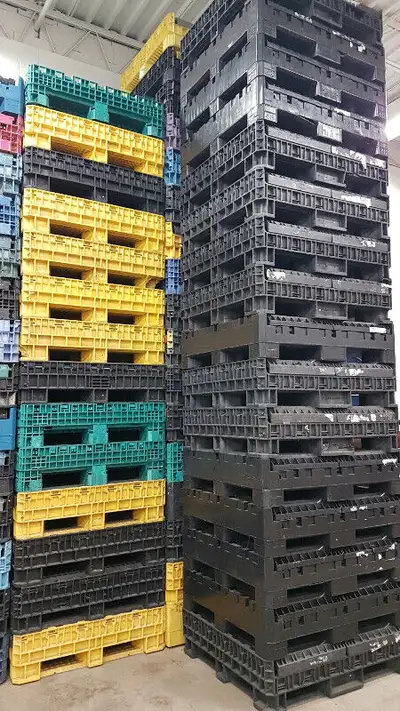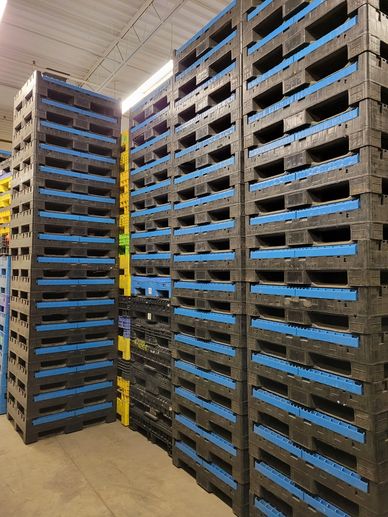Why used plastic containers are essential in food and manufacturing industries
Wiki Article
Innovative Solutions: Discovering the Adaptability of Mass Containers in Numerous Industries
Mass containers have emerged as an essential technology across multiple industries. Their style improves storage and transport performance, dealing with varied demands while advertising sustainability. Businesses in agriculture, manufacturing, and logistics report significant enhancements in operational processes. The true degree of their effect may not yet be completely recognized. Checking out the different applications and benefits of bulk containers might disclose insights that reshape industry standards. What exists in advance for this advancing remedy?Enhancing Agricultural Performance With Mass Containers
Exactly how can bulk containers transform farming techniques? In the domain name of farming, bulk containers function as a pivotal innovation, boosting performance and sustainability. They make it possible for farmers to keep and deliver big quantities of seeds, grains, and plant foods, reducing the need for numerous smaller packages that often add to lose. By using bulk containers, farming operations can optimize their supply chains, decreasing dealing with costs and time. These containers are made for simple loading and unloading, permitting for quick changes between various stages of farming processes.Mass containers promote much better supply administration, making certain that producers have sufficient products on hand without unwanted. This efficiency translates to minimized labor expenses and boosted productivity. In an industry usually challenged by varying need and seasonal variants, the integrity and scalability provided by mass containers offer a substantial benefit, equipping farmers to concentrate on high quality and yield.
Enhancing Manufacturing Processes Through Bulk Solutions
Bulk options play a necessary duty in simplifying production processes by assisting in effective product handling and giving economical storage alternatives. These containers assist maintain a well organized production setting, eventually boosting operations and performance. As markets progressively embrace mass services, they are most likely to experience substantial renovations in operational efficiency.Reliable Product Handling

Efficient material handling is necessary for optimizing manufacturing processes, as it directly affects performance and cost-effectiveness. Utilizing bulk containers can significantly simplify procedures by streamlining the movement and storage of materials. Their design allows for easy loading and discharging, minimizing the moment employees invest managing specific things. This performance not just decreases labor prices yet additionally boosts operations, making it possible for producers to respond promptly to require changes. Additionally, mass containers advertise far better company within facilities, assisting in fast access to materials and reducing downtime. By implementing these versatile solutions, manufacturers can improve overall operational efficiency, ensuring that assembly line run efficiently and successfully while reducing waste and resource expense. Bulk containers play an essential duty in improving material handling techniques.
Economical Storage Solutions
As manufacturers look for to optimize their procedures, economical storage remedies come to be progressively important. Mass containers offer a practical methods of keeping huge quantities of products, decreasing the demand for several smaller sized storage systems. This loan consolidation leads to lower stock costs, as bulk containers usually need much less handling and lead to lowered labor expenses. Additionally, their standardized sizes promote efficient piling and storage space, making best use of storehouse space. By utilizing bulk containers, makers can minimize waste and enhance the overall organization of their centers. These containers are additionally created for sturdiness, which can reduce replacement expenses gradually. Overall, integrating mass containers into storage methods enables makers to simplify procedures while keeping profitability and effectiveness in their supply chains.
Enhanced Manufacturing Workflow
Using bulk containers substantially enhances manufacturing workflows by simplifying the monitoring of materials throughout the production process. These containers assist in efficient storage and transport, lowering the time invested on taking care of materials. Therefore, manufacturers can accomplish quicker turn-around times and reduce hold-ups in production. Bulk containers additionally advertise better company, permitting teams to quickly access basic materials when needed, which better improves procedures. Additionally, the standardized dimension and form of these containers enable optimized use stockroom space, contributing to overall effectiveness. By incorporating mass services into their operations, business can improve stock control and decrease waste, eventually bring about boosted productivity and a much more active manufacturing setting.Revolutionizing Food Service Logistics
The food service market is going through considerable change with the adoption of bulk containers, enhancing storage capabilities and optimizing area use. Effective storage services enable companies to manage inventory better, while structured transport processes reduce prices and boost distribution times. Consequently, these technologies are improving logistics and driving greater efficiency across the industry.
Efficient Storage Space Solutions
Ingenious storage services are changing food solution logistics by improving efficiency and maximizing space utilization. Mass containers, made for optimum capability, enable food company to decrease thrown away room while preserving very easy access to products. These containers can be piled and organized according to stock needs, streamlining the storage space process. Additionally, their sturdiness warranties that food continue to be safe and secure and risk-free, decreasing putridity and losses. With attributes such as modular styles and compatibility with various shelving systems, these containers can adapt to varied cooking area layouts. By using efficient storage space solutions, food solution procedures not only boost workflow yet likewise boost overall performance, guaranteeing that resources are made use of efficiently to satisfy consumer needs.Streamlined Transport Processes
While lots of factors add to the efficiency of food solution logistics, structured transportation procedures play a vital role in enhancing supply chain procedures. The adoption of bulk containers substantially improves the motion of goods, enabling quicker loading and unloading at distribution centers. Their standard dimensions facilitate efficient stacking and storage space, decreasing squandered area during transportation. In addition, mass containers lower the need for extreme packaging, leading to decrease expenses and reduced environmental effect. By guaranteeing that products are safely delivered, they alleviate damages and spoilage, which is important in the perishable food sector. In general, the integration of bulk containers into transportation methods not only boosts functional effectiveness but also supports sustainable methods within the food service industry.The Duty of Bulk Containers in Drug Supply Chains
In the pharmaceutical sector, mass containers play a crucial role in ensuring the efficient and secure transport of basic materials and ended up items. These containers are particularly developed to meet stringent governing needs, supplying suitable protection versus contamination and deterioration during transit. Their durable building permits the safe and secure transportation of sensitive materials, such as energetic pharmaceutical active ingredients (APIs) and intricate formulas, while minimizing the risk of damages.Bulk containers facilitate structured handling and storage space operations within storehouses and production centers. Their standardized sizes enable compatibility with automated systems, improving efficiency and minimizing labor prices. By using mass containers, pharmaceutical business can attain considerable cost financial savings via bulk getting and decreased packaging waste.
Promoting Sustainability in Product Packaging Practices
The pharmaceutical market's boosting dependence on mass containers has triggered a broader evaluation of sustainability in packaging techniques throughout various markets. As companies seek to minimize their environmental impact, ingenious strategies to product packaging have gotten traction. Mass containers, made for reuse and recycling, present a useful option. Their resilience expands product lifecycles, minimizing the need for single-use packaging.The change in the direction of biodegradable materials and environmentally friendly finishings has actually ended up being important in the style of these containers. This modification not just addresses waste decrease however additionally lines up with customer demand for sustainable products.
Industries such as food and cosmetics are embracing comparable methods, recognizing that lasting product packaging can boost brand track record. Joint efforts between distributors and makers additionally promote sustainability, motivating the advancement of closed-loop systems - used collapsible containers. Eventually, accepting sustainable packaging techniques is crucial for cultivating a circular economic situation and minimizing the environmental footprint across varied markets
Affordable Transport Solutions With Mass Containers

Bulk containers improve managing procedures, leading to decreased labor costs and decreasing the threat of damages during transportation - used collapsible containers. Industries such as farming, chemicals, and drugs gain from the resilience and robustness of these containers, which can hold up against extreme problems while guaranteeing the honesty of their components
The recyclable nature of mass containers contributes to lasting savings, as companies can count on less, much more resilient units rather than regularly replacing single-use product packaging. In this way, mass containers not only boost efficiency but additionally sustain general expense management in supply chain operations.
Modification and Adaptability in Mass Container Design
While numerous bulk containers are made for conventional applications, their customization and versatility have actually become vital features for markets with one-of-a-kind requirements. Suppliers now use a series of options, enabling customers to tailor containers to certain measurements, products, and functionalities. This versatility makes it possible for businesses to optimize storage and transport processes, guaranteeing compatibility with different managing systems.The food and pharmaceutical industries usually require containers that fulfill stringent hygiene and security criteria. Personalized layouts might include functions such as tamper-proof seals, easy-to-clean surface areas, and specialized air flow systems. In the farming sector, mass containers can be customized to help with the transport of varied assets, from grains to liquids, boosting functional efficiency.
Eventually, the ability to tailor bulk containers not just improves performance but also sustains sustainability initiatives by minimizing waste and taking full advantage of source usage throughout several industries. This versatility positions bulk containers as versatile services in today's vibrant market.
Regularly Asked Inquiries
What Materials Are Mass Containers Normally Made From?
Bulk containers used collapsible bulk containers are usually made from products such as high-density polyethylene (HDPE), steel, polypropylene, or aluminum. These products offer resilience, resistance to chemicals, and the capacity to safely store and carry numerous items across industries.Just How Are Bulk Containers Cleaned Between Uses?
Bulk containers are generally cleansed using high-pressure washing, vapor cleansing, or chemical sanitization methods (refurbished bulk containers). The cleaning procedure warranties that residues are removed, stopping contamination and maintaining the top quality of materials for succeeding usages
Can Bulk Containers Be Reused Several Times?
Yes, bulk containers can be recycled numerous times. Their durable style enables repeated usage throughout different applications, supplied they are appropriately cleaned up and maintained after each usage to guarantee security and health standards.What Are the Weight Limits for Bulk Containers?
Weight restrictions for mass containers typically range from 1,000 to 3,000 extra pounds, depending upon the product and design. Requirements may vary by manufacturer, so it is critical to speak with guidelines for specific container types.Are There Typical Sizes for Bulk Containers?
Yes, there are basic dimensions for bulk containers, normally ranging from 20 to 40 cubic feet. These measurements assist in efficient storage and transportation across different markets, ensuring compatibility with devices and optimizing space utilization.Making use of mass containers can considerably improve procedures by simplifying the activity and storage space of products. In addition, mass containers advertise better organization within centers, assisting in fast access to materials and minimizing downtime. Mass containers give a practical means of storing big amounts of materials, reducing the demand for several smaller sized storage systems. The food service industry is undertaking substantial change via the adoption of bulk containers, boosting storage capabilities and maximizing space use. Bulk containers help with structured handling and storage procedures within warehouses and production centers.
Report this wiki page